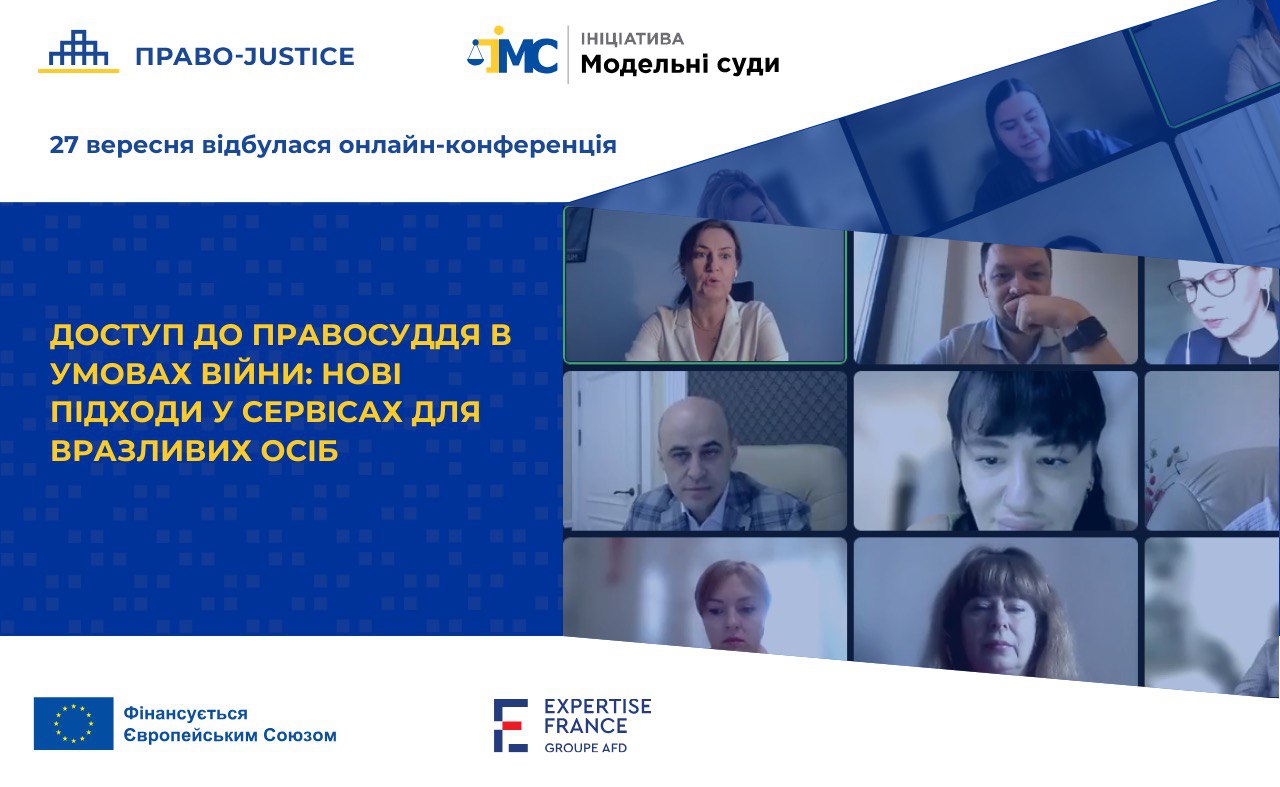Representatives of the judiciary, judges and court staff discussed new approaches to services for vulnerable persons

On 27 September, EU Project Pravo-Justice held a conference “Access to Justice in Wartime: New Approaches to Services for Vulnerable Persons” within the framework of the Model Courts Initiative.
Opening the event, Bohdan Monich, Head of the Council of Judges of Ukraine, noted that the topic of supporting vulnerable categories of court service users is important and that the CJU is actively working in this direction.
“This is a very important area of work for the Council of Judges of Ukraine, and we intend to pay more and more attention to it. After all, we need to guarantee access to justice for everyone, taking into account the special needs of different categories of vulnerable court users,” said Bohdan Monich.
Maksym Pampura, acting Head of the State Judicial Administration of Ukraine, thanked EU Project Pravo-Justice for its cooperation in implementing special services for vulnerable court visitors and for the ongoing support in sharing courts’ experience among colleagues, especially now, during the martial law.
“Today, supporting vulnerable court users is extremely relevant due to the large number of internally displaced persons, war crimes victims and witnesses, war veterans and other categories of vulnerable persons who need assistance while participating in court proceedings,” said Maksym Pampura.
The conference participants were also greeted by Tetiana Pustovoitova, Head of the International Cooperation Department of the National School of Judges. She emphasised that the NSJU has been actively participating in all the training of trainers courses on implementing services for vulnerable court users and disseminating its materials and best practices at its trainings.
In turn, Oleksandr Baranov, Director of the Coordination Centre for Legal Aid Provision, added that the Coordination Centre is also seeking to expand services designed to support vulnerable court users within its scope of work.
For her part, Anna Adamska-Gallant, International Key Expert on Judicial Reform of EU Project Pravo-Justice, stressed that the Project has been working on implementing services for vulnerable court users for four years now, without stopping even during martial law.
“Based on the outcomes of four iterations of the course, we already have good sustainable results. We have a large community of trainers, a graduate of the course has developed a concept for arranging the operations of general local and appellate courts in terms of victim and witness support, and the National School of Judges actively uses the course materials in its training activities. This is all very important given the growing need for the judiciary to be able to work with vulnerable visitors, including war crimes victims and witnesses, children, and internally displaced persons,” emphasised Anna Adamska-Gallant.
Yevheniia Bondarenko, EU Project Pravo-Justice National Expert, spoke about new approaches to implementing services for vulnerable people.
“After completing the training of the fourth iteration of trainers on implementing services for vulnerable court users, our community of certified trainers has already grown to 127 members. Each of them implements their own interesting projects for vulnerable people. Thus, more than 65 model solutions in the field of support have already been implemented to date,” said Yevheniia Bondarenko.
Kateryna Ilikchiieva, National Expert of the Project, added how services for vulnerable persons help in ensuring access to fair trial while taking into account the ability of different groups of people to go to court National Expert of the Project, added how services for vulnerable persons help in ensuring access to fair trial while taking into account the ability of different groups of people to go to court.
Irina Urumova, International Expert of EU Project Pravo-Justice, spoke about adapting the course to the context of the military conflict.
“What has changed? We have focused on such aspects as understanding the specifics of victimisation in armed conflict, meeting the needs of victims, victim-centred evidence collection and preservation, protection of children and vulnerable adults in conflict, and prevention of criminal victimisation of IDPs and refugees,” said Irina Urumova.
Also, during the event, Anna Mostetska, judge-speaker of the Ternopil City and District Court of Ternopil region, certified trainer of the 2nd iteration, presented the concept of arranging the operations of general local and appellate courts as to supporting victims and witnesses and invited everyone to participate in its consideration and implementation.
“The purpose of the concept is to introduce a support service to enable victims and witnesses to participate fully and effectively in court proceedings, to protect them from secondary and repeated victimisation, intimidation and retaliation, and to provide them with appropriate support in restoring and protecting their rights and interests,” said Anna Mostetska.
Natalia Korol, Head of the NGO “All-Ukrainian Association of Court Employees”, Chief of Staff of the Vinnytsia Court of Appeal, certified trainer of the 1st iteration, spoke about a type of services called supporting victims of domestic violence.
Graduates of previous iterations shared their implemented services. Graduates of the fourth iteration of the aforementioned training course also presented their projects for implementing services for vulnerable court users during martial law.